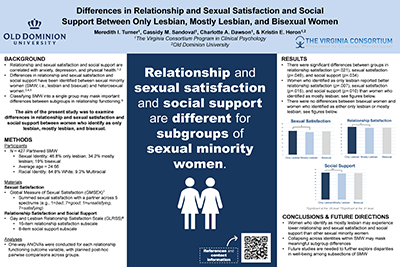ORCID
0000-0003-2638-1174 (Eggler), 0000-0002-6229-0934 (Olenick)
College
College of Sciences
Department
Psychology
Graduate Level
Doctoral
Graduate Program/Concentration
Industrial Organizational Psychology
Publication Date
2023
DOI
10.25883/5svf-7265
Abstract
When addressing diversity, equity, and inclusion, researchers and organizations often focus on group differences in outcomes of interest. However, groups do not always interpret surveys in the same way, causing measurement nonequivalence. Measurement nonequivalence makes it difficult, if not impossible, to compare group differences presenting a problem for how conclusions are drawn. To better understand group differences in survey responding, the current study assessed measurement invariance across five diversity-related measures using the methods outlined by Nye and colleagues (Nye et al., 2019; Somaraju et al., 2022). Data were collected across three organizations (N = 732) from different industries (i.e., healthcare, construction, information technology). Results indicate that for all five measures, there was significant measurement nonequivalence across organizations such that all but the referent item were found to be nonequivalent. We also examined measurement invariance across race and gender where all measures in all organizations were nonequivalent. Interestingly, these effects were not similar across organizations. The construction company had strong gender effects across measures (dMAC = -.64 to -.13), but weak racial effects (dMAC = -.08 to .34). In contrast, the healthcare company had relatively stronger racial effects (dMAC = -.62 to -.35) than gender (dMAC = -.43 to -.01). The information technology company had low effects for both race (dMAC = -.29 to .04) and gender (dMAC = -.20 to .09). Given these results, there are several implications for both research and practice. Researchers should not assume that samples collected across multiple organizations are equivalent and the use of hierarchically nest models may be necessary to account for group differences. Further, greater attention is needed in measurement development to ensure their validity across groups. For practitioners, we recommend utilizing open-ended survey items to better capture group differences due to the prevalence of high measurement nonequivalence in closed-items.
Keywords
Diversity, Measurement variance
Disciplines
Industrial and Organizational Psychology
Files
Download Full Text (339 KB)
Recommended Citation
Eggler, Kristen Denae; Olenick, Jeffrey; Surface, Eric A.; and Ousterout, Jamie, "When Diversity Measures Are Nonequivalent: Advice for Practitioners" (2023). College of Sciences Posters. 13.
https://digitalcommons.odu.edu/gradposters2023_sciences/13




Comments
This poster was also submitted for the APA 2023 Annual Conference.